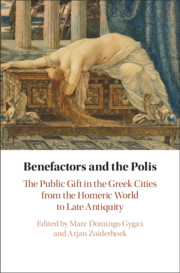 Benefactors and the Polis
Benefactors and the Polis Book contents
- Benefactors and the Polis
- Benefactors and the Polis
- Copyright page
- Contents
- Figures
- Tables
- Contributors
- Acknowledgements
- Abbreviations
- Introduction
- Part I Benefiting the Community in Early Greece
- Part II Classical Benefactors
- Part III Hellenistic Benefactors
- Part IV Benefactors and the Polis under Rome
- Part V The Decline and Fall of Euergetism?
- Conclusion
- Index
- Index locorum
- References
Part I - Benefiting the Community in Early Greece
Published online by Cambridge University Press: 21 January 2021
- Benefactors and the Polis
- Benefactors and the Polis
- Copyright page
- Contents
- Figures
- Tables
- Contributors
- Acknowledgements
- Abbreviations
- Introduction
- Part I Benefiting the Community in Early Greece
- Part II Classical Benefactors
- Part III Hellenistic Benefactors
- Part IV Benefactors and the Polis under Rome
- Part V The Decline and Fall of Euergetism?
- Conclusion
- Index
- Index locorum
- References
Summary

- Type
- Chapter
- Information
- Benefactors and the PolisThe Public Gift in the Greek Cities from the Homeric World to Late Antiquity, pp. 13 - 66Publisher: Cambridge University PressPrint publication year: 2021
